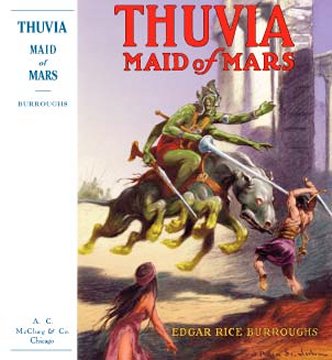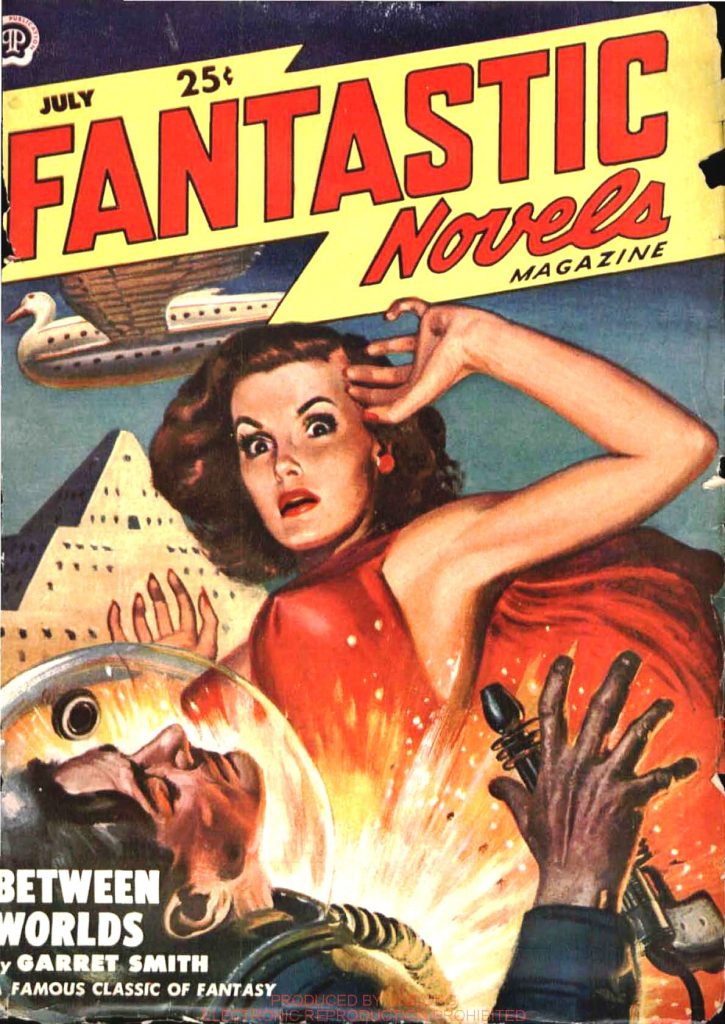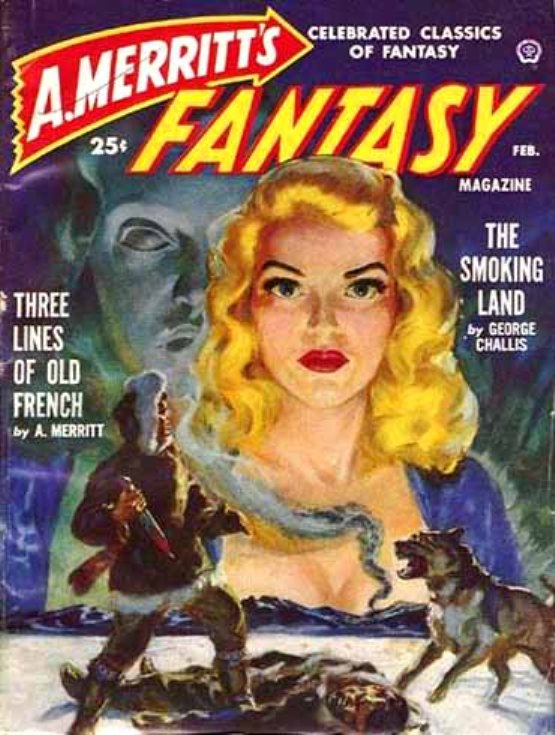SENSOR SWEEP: Weird Tribesmen, Unnecessary Backstory, Wonkish World-building, and Drooling Intellectual Giants
Monday , 11, September 2017 Sensor Sweep 21 Comments Appendix N (Shop on the Borderlands) “APPENDIX N: INSPIRATIONAL AND EDUCATIONAL READING” AND OTHER FANTASY RPG READING LISTS: PART 1 — “That distinction between swords & sorcery and epic high fantasy is important in the history of D&D and other fantasy RPGs. It’s clear from Appendix N, and from early modules like the Giants series or Tomb of Horrors, that Gygax intended D&D to reflect swords & sorcery. However, by the time D&D went really big in the 1980s (when yours truly started playing), swords & sorcery literature had gone out of fashion, and epic high fantasy was in the ascendancy. If you’d gone into a branch of W.H. Smith in 1984, you’d have found The Lord of the Rings, and Thomas Covenant, and Sword of Shannara, and The Belgariad, but probably nothing by L. Sprague de Camp or Fritz Leiber. There might have been a Conan book, but it was probably a movie tie-in.”
Appendix N (Shop on the Borderlands) “APPENDIX N: INSPIRATIONAL AND EDUCATIONAL READING” AND OTHER FANTASY RPG READING LISTS: PART 1 — “That distinction between swords & sorcery and epic high fantasy is important in the history of D&D and other fantasy RPGs. It’s clear from Appendix N, and from early modules like the Giants series or Tomb of Horrors, that Gygax intended D&D to reflect swords & sorcery. However, by the time D&D went really big in the 1980s (when yours truly started playing), swords & sorcery literature had gone out of fashion, and epic high fantasy was in the ascendancy. If you’d gone into a branch of W.H. Smith in 1984, you’d have found The Lord of the Rings, and Thomas Covenant, and Sword of Shannara, and The Belgariad, but probably nothing by L. Sprague de Camp or Fritz Leiber. There might have been a Conan book, but it was probably a movie tie-in.”
Science Fiction (The Last Redoubt) Review: Oath of Fealty — “When Pournelle stopped There Will Be War at the ninth volume, he started a new project, published by Baen, called Imperial Stars. It explored governments of the future, more than straight warfare. Included in the essays was an old Campbell essay where it was discussed tribesmen, barbarians, and civilized people, and that to a barbarian, civilized people looked an awful lot like weird tribesmen, subsuming themselves to the tribe. He closed with the point that future political changes past ‘civilized’ may take on structures that look a lot like the old, to our current selves.”
Movies (Yakov Merkin) Phasma: Star Wars Shows it Doesn’t Know How to Explore its Characters or What Fans Want — “We didn’t need to see Anakin’s whole backstory and fall to the dark side. Even if the prequels had been good movies, it was still an unnecessary story in many respects. In another angle, the EU also told us far too much about the details about Darth Vader’s suit, which we didn’t need at all, to the point where it basically became a joke. I’ve watched this RedLetterMedia video where they read from Wookiepedia (the Star Wars wiki) directly, about this, and it’s hilarious while also kind of sad, making Vader into almost a joke. We have seen similar phenomena elsewhere, with unnecessary books focusing on backgrounds of other minor characters.”
Television (Entertainment Weekly) Star Trek: Discovery to tackle Trump-era political divide — “The Klingons are going to help us really look at certain sides of ourselves and our country. Isolationism is a big theme. Racial purity is a big theme. The Klingons are not the enemy, but they do have a different view on things. It raises big questions: Should we let people in? Do we want to change? There’s also the question of just because you reach your hand out to someone, do they have to take it? Sometimes, they don’t want to take it. It’s been interesting to see how the times have become more of a mirror than we even thought they were going to be.”
D&D (Venger Satanis) Delving Deeper Into Old School — “I liken this division (having a number of striking similarities) as the difference between old and new testament in the Bible. We call early RPGs – such as 80’s D&D – old school as if it’s all the same. However, in some ways, those two camps – primordial and complex – couldn’t be further from each other. Do they get at the same things but with different approaches? Or do they each have completely separate goals?”
 From the Comments (Jon Del Arroz) Sci-Fi Sexism By The Numbers: It’s A Mean Girls’ Club — “Pretty sure that the short story market isn’t like a raffle where buying more tickets gets you a better chance of winning. I think the quality of the story you write has some influence on whether or not it gets published. Write a really good story, and you boost your chances of getting published close to 100% regardless of who you are. If you’re not getting published, maybe it’s not so much the number of theoretical ‘slots available’ for men and more that the story isn’t good enough?”
From the Comments (Jon Del Arroz) Sci-Fi Sexism By The Numbers: It’s A Mean Girls’ Club — “Pretty sure that the short story market isn’t like a raffle where buying more tickets gets you a better chance of winning. I think the quality of the story you write has some influence on whether or not it gets published. Write a really good story, and you boost your chances of getting published close to 100% regardless of who you are. If you’re not getting published, maybe it’s not so much the number of theoretical ‘slots available’ for men and more that the story isn’t good enough?”
Pulp Revolution (Rawle Nyanzi) Constant Adventure vs. Constant Worldbuilding — “Adventure Constant is a story that cares so much about building a fun world that it completely junks wonkish world-building logic in favor of what sounds cool. No explanation is given for why counterparts to familiar Earth nations sprang up, you do not question why the existence of Carthage, the continued rule of the Pharaohs, and the failed colonization of Africa gave rise to similar historical events, and you do not care to hear about economic minutiae or extensive national backstories. You’re given just enough information to orient you, and the characters get back to the plot. It is yet more proof of a key tenet about fantastical tales: Worldbuilding does not matter.”
Pulp Revolution (SuperversiveSF) The Beginnings of Pulp — “The English upper classes ignored the new medium. The middle classes, who feared anything that might diminish their advantages over the working class, hated it and sneered at it, dismissing all stories so told as ‘dreadful’. This was a calumny. As Theodore Sturgeon would certainly have said, nine-tenths of the penny serials were crap; but then, nine-tenths of the expensive books favoured by the middle classes were crap. The real sin of the penny dreadfuls was not that they were bad stories, but that they brought printed books within the reach of the Lower Orders.”
Appendix N (Gitabushi) Frustrations with Edgar Rice Burroughs — “Sometimes it is having incredible luck that saves John Carter from failure/death or otherwise continue the narrative. One would be irritating, but there have been at least 10 so far…way too many. Examples: How was it John Carter to Barsoom returned just in time to encounter Tars Tarkas? How was it Tars Tarkas wasn’t the Green Warrior surprised by the unexpected jumping tactics of the Plant Men? How did Thuvia and Tars happen to be right at the location where the damaged air car of John Carter, Xodar, and Carthoris comes to ground? Why does Thuvia have the ability of nearly perfect telepathy with beasts? Is this something other Barsoomians have? The answer seems to be that ERB needed something to get the characters through a nearly-impossible situation, so he just pulled something out of the air and ran with it.”
Appendix N (Joe Kushner) Three Hearts and Three Lions by Poul Anderson — “The use of Chaos and its minions, like the timeless and fey elves, who aren’t evil necessarily, but are bored and are capricious at best, are intent on spreading their world. For them, the sun and its light, for example, are anathema. Their own world lies in a subtle shade that protects them, and there is a distinct difference between the world of man and that of the Fey. The arrival of Holger is during a time when Chaos is on the rise. A time when Chaos may make a great play for the world. A time when Giants stalk the land and when those whose inheritance may have a touch of the old blood, are stirred to action.”
 Anti-Pulp (Tor.com) A Moment in a Life: Ursula K. Le Guin’s “The Day Before the Revolution” — “Laia is seventy-two, at the end of her life. She has had a stroke, and her right side has not completely recovered, she drools and is intensely self-conscious about it. She is an old woman, in a genre where we still see very few old women. And she is an old woman who remembers being six and sixteen, who still recognizes her sexuality, and who has been an intellectual giant, their world’s (better) equivalent of Marx. Her books of political thought have given a name to the movement, but now she’s old and a little vain and wants to keep thinking about the past.”
Anti-Pulp (Tor.com) A Moment in a Life: Ursula K. Le Guin’s “The Day Before the Revolution” — “Laia is seventy-two, at the end of her life. She has had a stroke, and her right side has not completely recovered, she drools and is intensely self-conscious about it. She is an old woman, in a genre where we still see very few old women. And she is an old woman who remembers being six and sixteen, who still recognizes her sexuality, and who has been an intellectual giant, their world’s (better) equivalent of Marx. Her books of political thought have given a name to the movement, but now she’s old and a little vain and wants to keep thinking about the past.”
No Sale (Black Gate) Companion Robots, Grave Robbing, and Monster-haunted Catacombs: July/August 2017 Magazine of Fantasy and Science Fiction — “I try my best not to let my editor experience at HFQ color my reviews too much, but this time I failed my willpower role. A kind of alternate-history story of a slave uprising in the Deep South, centered around one Afiya, a young black woman who, through song, can channel ancestor magic. It is well written, and the subject is a unique take on things, but… by now I’ve read dozens of stories where young protagonist is shunned because of the Power and finally after enough indignities and injustices gives in to the Power and some people are made to regret their choices. Is that how ‘Aifya’s Song’ goes? Maybe, maybe not, but I didn’t stick it through to find out.”
I’d thank you, but I totally put that post up as bait for you to link me.
So thank you!
“She is an old woman, in a genre where we still see very few old women. And she is an old woman who remembers being six and sixteen, who still recognizes her sexuality, and who has been an intellectual giant, their world’s (better) equivalent of Marx.”
When I’m drooling in my hospital bed in the hallway, I hope I will be able to pinch the nurse’s ass and whisper muuh diiiiik.
Not that Star Wars hasn’t gone WAAAAY far astray, but the problem is, that Star Trek summary of activism via science fiction has ALWAYS been part and parcel of Star Trek. No wonder Star Wars has mainstream appeal that Star Trek can only dream about.
-
Timothy Sandefur wrote an excellent essay tracking how Star Trek has changed over the years in parallel with changing views on the Left.
http://www.claremont.org/crb/article/the-politics-of-star-trek/
I see a lot of defenses of the new Star Trek show that basically say “Star Trek has always been political/left-wing/topical!” but IMO the “relevant” episodes of the original series were always the worst, most tedious of the lot. The only interesting thing about the racism episode, for instance, is Frank Gorshin’s performance because Gorshin is awesome. When the show stuck to full-on, big idea sci-fi and adventure, it was generally great.
On the Mean Girl’s Post:
Are there any SFF Magazines or Publishers that a man who hasn’t taken a creative writing course may have a shot at being published? I’ve tried Smokelong Quarterly, Daily Science Fiction, 100 Word Story, Havok, Bear Publications, and InterGalatic Medicine Show; to no avail. I’ve been told my stories aren’t bad they just choose not to publish them.
On the Tor Article:
What is Anti-Pulp? I’ve seen the term a few times but can’t tell if it is a category of literature or a genre of fiction.
-
Try Cirsova and Bryce Beattie’s StoryHack! They bring the heat without the pretension.
I would say that over-reliance on coincidence is a valid criticism of ERB, and any writer as prolific as he was was going to have the occasional dud, too. He made up for it in many other ways.
-
I agree that ERB could’ve backed off on the co-ink-a-dink a little, Andy. I also agree that the storytelling skills and the supernova that Burroughs called his “imagination” steamroll such piddling quibbles.
If Gita was half as well-informed as he constantly reminds us he is, he would know that coincidence was a common feature of Victorian lit, which was a major influence on ERB. It all comes down to a widespread cultural belief in Providence — in other words, God. In general, that was gradually lost after WWI, but Burroughs held onto it. It was a literary convention of the time, just as we have others now. Shakespeare used coincidence, for Crom’s sake. Get over it, Gita.
Gita is going to give CJ Cherryh fans a bad name.
http://digitalcommons.lsu.edu/cgi/viewcontent.cgi?article=7633&context=gradschool_disstheses
-
Exactly. Virtue and courage is rewarded. The cosmic balance is maintained.
Gita wants to keep things “real” and whines when coincidence rears its unlikely head, yet he’s fine with scientifically impossible Faster Than Light drives. I asked him about that in regard to “Hard” SF and Larry Niven. His riposte was to claim I was drunk. Not. An. Argument (and inaccurate).
Gitabushi: Making CJ Cherryh fans ashamed since 2016.
-
And continential litrrature. If I remember right there was coincidence (more like Providence making a direct appearence) in Tirant lo blanc. I’d have to read Curial i Güelfa to see if Providence is also present
xavier
-
-
Gita going full auto on coincidence in fiction just betrays the fact that he’s got one foot in the Modernist/”Literarary Realist” camp. William Dean Howells — and Gita’s English Lit professor, I’m sure — would both be very proud of him.
Nothing against Yakov’s article, I found it really well written but I can’t agree with his assessment of the Expanded Universe. Quite honestly the literary Star Wars universe was something near and dear to my heart. I really don’t see how creating the Mandalorians and making Boba Fett one of them takes away from his character (like you said he barely had one). In the end it’s glorified fanfiction and you don’t have to pay attention to it.
-
Though being fair I do know a number of people who don’t like things straying too far from the original creators vision. I have a similar problem with Halo’s expanded universe. The Flood and the Forerunners have been a lot less appealing story wise since Halo 4.
So I respect your opinion I just got a soft spot for the old material. (Love your book btw)
-
The bigger problem with Halo is not that the glorified fanfic exists, but that it replaced the real series.
As far as Star Wars goes, IMO even the prequels are more canon than Rey Sue & Co. I can thank the excellent Clone Wars TV series for that.
-
The problem that the game creators started taking ideas from the novels or that the novels are outshining the Games in quality?
-
-